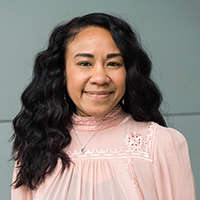
Valuing Student Diversity: Culturally Responsive Teaching in the Visual Arts Classroom
-
Register
- Non-member - $49
- Member - Free!

Valuing Student Diversity: Culturally Responsive Teaching in the Visual Arts Classroom
Wednesday, April 22, 2020 | 7-8 pm ET
FREE for NAEA Members; $49 for non-members
It is evident that growing diversity has had a significant impact on education in urban, rural, and suburban areas. Research and practice continues to demonstrate the need for strong teacher in-service and preservice programs to connect home, school, and community with culturally-relevant or culturally-responsive teaching strategies. This approach will not only expose students to diverse curriculum and best teaching practices but can encourage them to remain focused, become invested in what is happening, and actually step onto the road of academic success and social achievement.
During this webinar, you will learn from examples of culturally responsive art instructional strategies, happening in K-16 environments. As the field of (art) education endeavors to become a culturally, socially and racially equitable system, educators often need a space to support their own developing professionalism around these issues. The aim of the presenters is to provide that space.

Hazel L. Bradshaw-Beaumont Young
Hazel L. Bradshaw-Beaumont Young, PhD
Professor, Art Education, Delaware State University, Dover, Delaware
Hazel L. Bradshaw-Beaumont Young has been the Professor at Delaware State University since 2002 and serves as the coordinator of the Art Education program and the Assessment Fellow for the Department of Art. She earned a PhD in Art Education from The Ohio State University, a MS in Art Education with a concentration in Art Therapy from Buffalo State University, and a BA in Art Education, Textile Printing, and Weaving from the Edna Manley College of the Visual and Performing Arts in Jamaica, West Indies. Hazel currently serves as the Chair of the Committee on Multiethnic Concerns (COMC), a NAEA Interest Group. As a native of Jamaica, she served for 22 years as faculty at The University of the West Indies, Shortwood Teachers’ College, Edna Manley College of the Visual and Performing Arts, and Wolmer’s Girls High School. At Shortwood, she served in many administrative positions, including department chair, consultant with the Joint Board of Teacher Education at the University of the West Indies and the Ministry of Education in the areas of Special Education and Educational Research, the Caribbean Examinations Counsel, and the United Nations Educational Scientific and Cultural Organization (UNESCO).

Gloria J. Wilson
Gloria J. Wilson, PhD
Assistant Professor of Art and Visual Culture Education, University of Arizona
Gloria J. Wilson has been an art educator for 20 years, including 13 of those years teaching in urban and rural K-12 environments. Gloria has been a Fulbright recipient and has presented her research nationally and internationally, highlighting the intersections of racial identity, arts participation, and equity in arts education. She has presented workshops for Harvard Graduate School of Education’s Project Zero and has been an invited artist/researcher for The Spelman College Museum of Fine Art’s BLACK BOX series. Gloria’s research interests include Critical Arts-Based approaches and she is inspired by, and committed to, addressing the social and political role of race and visual culture, in order to affect educational transformation. She currently serves on editorial review boards for Art Education as well as The Journal of Social Theory in Art Education.
Upon completion of this NAEA webinar, you may earn 1 hour of professional development credit as designated by NAEA. Once the webinar is completed, you may view/print a Certification of Participation under the "Contents" tab. You may also print a transcript of all webinars attended under the "Dashboard" link in the right sidebar section of the page.
Clock hours provided upon completion of any NAEA professional learning program are granted for participation in an organized professional learning experience under responsible sponsorship, capable direction and qualified instruction, and can be used toward continuing education credit in most states. It is the responsibility of the participant to verify acceptance by professional governing authorities in their area.
